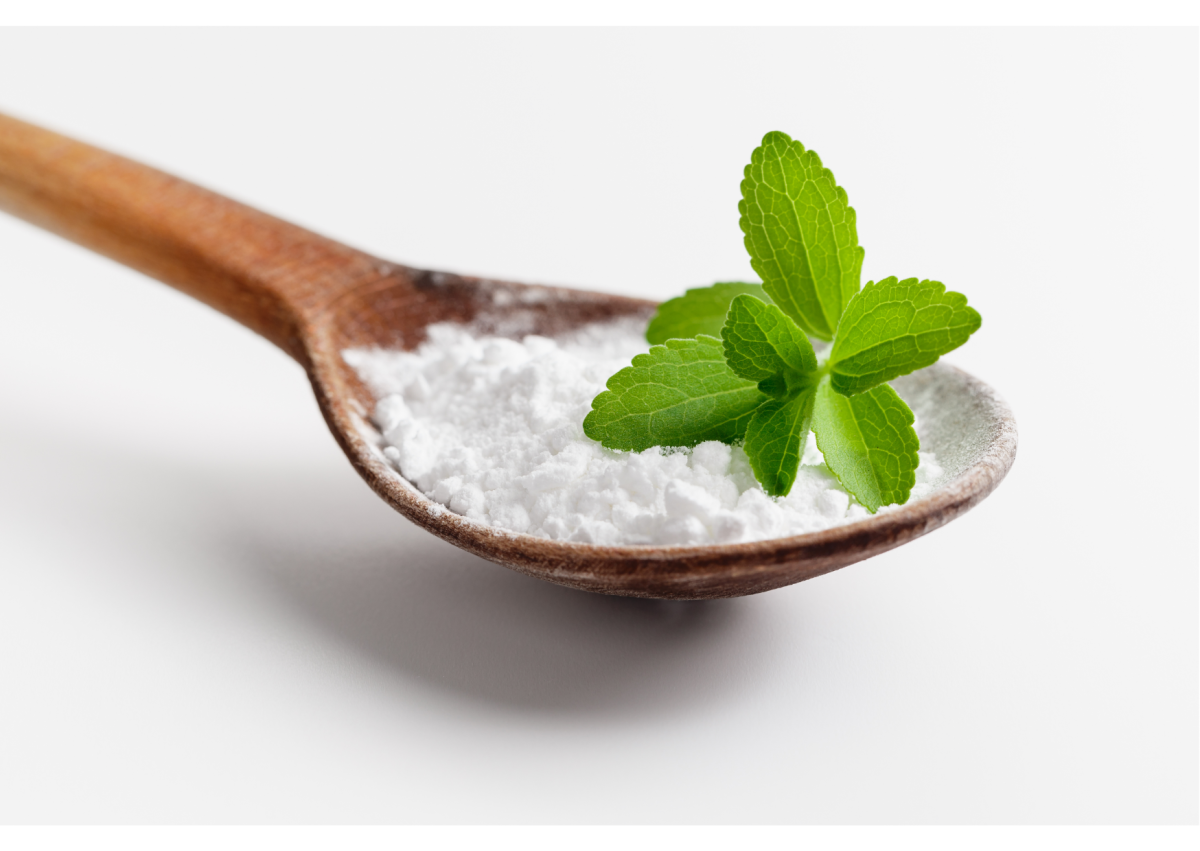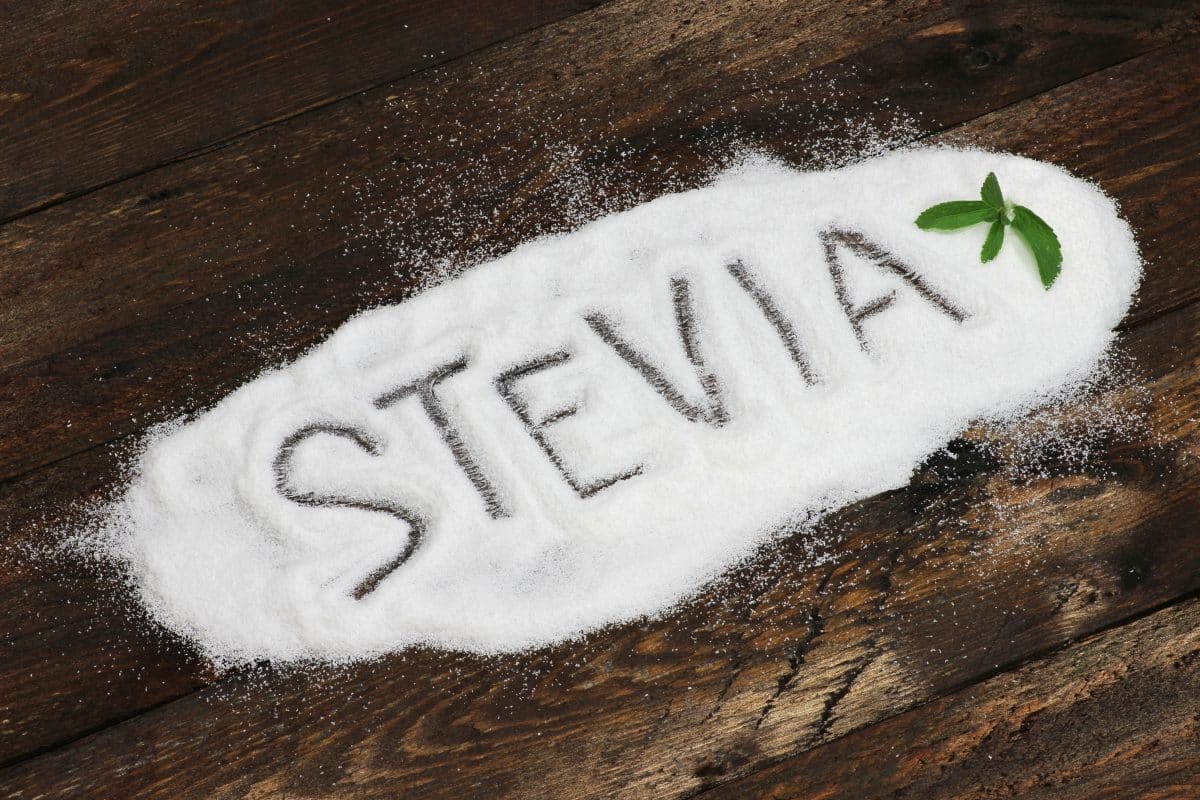The stevia IBS link: comprehensive guide
- Dietary Advice (non Low FODMAP)
Are you wondering if there is a stevia-IBS link when it comes to your symptoms worsening? Read on.
In a world trying to reduce sugar consumption to improve health, reduce weight, and aid blood sugar control, turning to sweeteners may be the answer, but some sweeteners may worsen your IBS symptoms.
Stevia is a common sweetener. It is likely that you can consume stevia in the natural form if you have IBS. BUT there are some instances where stevia may not be suitable for people with IBS, listed below.
This blog will cover stevia and IBS, considering the low FODMAP diet, and touch on sugar cravings.

What is Stevia?
Stevia is a natural sweetener derived from the leaves of the Stevia Rebaudiana plant. The stevia leaves that have been extracted are sweeter than sucrose, contain zero calories, and have a glycemic index of zero (1).
Stevia may also be known as sweet weed, sweet leaf, sweet herbs, and honey leaf (1).
Stevia plants have functional and sensory properties, providing more benefits than other alternative sweeteners (2). Sensory benefits demonstrate stevia has a sweeter taste.
Consumption of stevia may also help to lower blood pressure, or control blood glucose levels due to a lack of carbohydrates in them (3).
As stevia contains no calories it would also not contribute to your daily energy intake (3).
Does stevia make IBS worse?
There is currently no research looking specifically at stevia and IBS.
However, one interesting study found that stevia consumption may have a potential to benefit the gut microbiota in the general population (4).
Sadly, this study was done in test tubes so we can not draw conclusions just yet.
Commercial stevia products often contain a variety of ingredients besides the pure stevia extract. Some common ingredients found in commercial stevia products include:
- Other sweeteners such as erythritol, xylitol, or maltodextrin (sugar alcohols).
- Bulking agents including dextrose, cellulose, or inulin.
- Natural flavors to improve taste such as fruit juice.
- Artificial additives like artificial colors, preservatives, or stabilizers.
- Fillers including silica, magnesium stearate, or rice flour (5).
It is the added ingredients that can worsen IBS. Examples include the sugar alcohols or bulking agents such as inulin.
Typical products include soft drinks, canned fruit and jams, ice cream and other dairy products, cakes and desserts, and alcoholic beverages (5).
You may need to limit some of these products depending on what your personal tolerance levels are.
For more information – read about Irritable Bowel Syndrome & Low FODMAP diet.
Does stevia cause gas and bloating?
Stevia is generally not known to cause gas and bloating.
Stevia extract is non-fermentable and does not contain carbohydrates or sugars that typically lead to gas and bloating.
It is usually the other added ingredients in products which contain stevia that may worsen IBS symptoms (5).
Is stevia low FODMAP?
Stevia is a low FODMAP sweetener, making it a suitable choice for those following the low FODMAP diet.
If you want more information on the FODMAP content of stevia, check out our other post ‘Is Stevia FODMAP friendly.’

What are the best sweeteners for IBS?
For IBS sufferers, the best sweeteners are typically those that are low in FODMAPs and don’t cause gastrointestinal distress.
Options include natural stevia and pure maple syrup, both certified low FODMAP by Monash.
The best sweeteners for IBS tend to be low in FODMAPs. For more information – read low FODMAP sweeteners + brand list.
7 IBS friendly ways to use stevia
- Sweeten drinks: add stevia to beverages such as herbal teas, coffee, or homemade lemonade to enhance sweetness without the use of high-sugar sweeteners.
- Baking: use stevia in baking low FODMAP treats like muffins, cookies, or cakes. Be mindful of the conversion ratio as stevia is significantly sweeter than sugar, so smaller amounts are needed.
- Yogurt or smoothies: stir stevia into plain lactose-free yogurt or incorporate it into low FODMAP smoothies for added sweetness without the use of high FODMAP fruits or sweeteners.
- Oatmeal or cereal: sprinkle stevia onto oatmeal or low FODMAP cereals to sweeten breakfast options.
- Homemade sauces and dressings: use stevia to sweeten homemade sauces or salad dressings, ensuring control over ingredients and FODMAP content.
- Fruit infusions: create fruit-infused water using low FODMAP fruits like strawberries or oranges and add stevia for sweetness.
- Low FODMAP desserts: make low FODMAP desserts like gelatin-based treats or homemade ice pops sweetened with stevia instead of high FODMAP sweeteners.
Is White Sugar Bad for IBS?
White sugar is low in FODMAPs and can be easily absorbed in your small bowel. It is unlikely to cause IBS symptoms alone. If you get symptoms, this is likely due to other components of that food.
The malabsorption of certain sugars may cause symptoms if you have IBS. Read more on What is The Link For Sugar & IBS.
There is no current evidence to suggest white sugar is bad for IBS.
IBS and Sugar Cravings
There isn’t a direct link between IBS and sugar cravings to date.
If you have IBS, you may experience sugar cravings due to fluctuating blood sugar levels or as a response to dietary restrictions. This can impact your level of satiation (feeling of fullness).
Finding a balance with sweeteners like stevia can help manage these cravings without aggravating IBS symptoms.
Sudden urges for sweet foods, emotional triggers such as anxiety or stress, or even hormonal changes can be a sign of sugar cravings in IBS. This can lead to those with IBS under or over restricting their diet.
Summary
If you have IBS and a sweet tooth, stevia emerges as a commendable choice due to its low FODMAP status, its negligible impact on blood sugar levels, and its potential to help reduce weight in some people.
When choosing commercial stevia products, check for other ingredients, which might trigger IBS symptoms.
More research is needed to determine if there is a stevia IBS link. Natural stevia can be enjoyed as part of a healthy, balanced diet suitable for those with IBS.